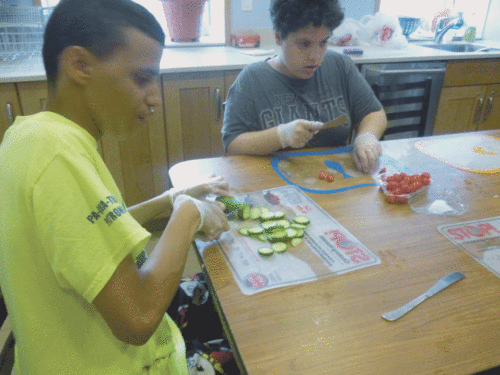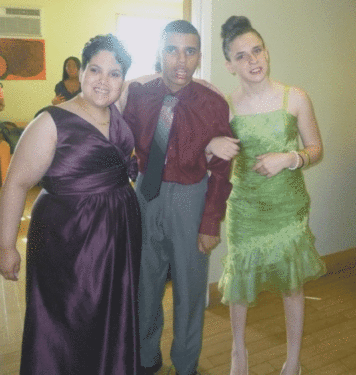Where Have All the Convents Gone?
This is the third in a series on how former convents are now being used in Brooklyn and Queens.
At the old convent building at St. Finbar, Bensonhurst, where nuns once prayed and worked, children now learn and play.

The parish has leased the building to HeartShare Human Services of New York, a Catholic organization with over 100 programs in Brooklyn, Queens and Staten Island that cares for the most vulnerable in society. HeartShare uses the building to house its Caruana and Eaton Residences, which provide a stable home for children with severe autism.
Together with the assistance of qualified professionals, children develop life and social skills with dance parties, arts and crafts, yoga, swimming and cooking lessons on the weekends, and after they come home from school on weekdays.
Deborah Muse, coordinator of the two programs, said a recent highlight was when the children had a prom night, complete with gowns, tuxes and a limo ride, all made possible through generous donations. Parents were also invited to participate in this joyous occasion.
Due to the severity of their developmental disability and severe behavioral challenges, parents have requested that their children be placed with a qualified housing program that can help their children thrive.
Muse said parents make this difficult choice when they are simply unable to provide their children with the 24/7 professional care that they require. “There are a lot of people looking for places but we only have so many rooms so we can only accommodate so many,” Muse said.
When children enter the program they must learn important life skills and the staff celebrates each victory. For example, one of the residents would scream at the very sight of a tooth brush and his parents were only able to get him to brush his teeth once every other week.
With professional help and lots of positive encouragement, this individual now brushes his teeth twice a day with hand-on-hand assistance, Muse said.
Among Muse’s most proud moments in the house was when everyone stopped using diapers. When the programs opened five years ago, the children all used diapers. Then when Muse became the coordinator for both programs, she decided it was time that everyone became toilet trained and stuck to it. Although this requires staff to make bed checks every half hour at night, Muse said it is well worth it for the health and well being of the children.
HeartShare also helps these young people to reach for emotional maturity. They have designated safe spaces to cool down and receive plenty of positive reinforcement when they display desired behavior.
“It’s important to establish good habits when they are children, because it is much harder to do so when they are adults,” Muse said.
Staff members help the youth, nearly all of whom have a strong attachment to repetition, change their routine or be prepared for new things with tools such as social stories. They place the individual child at the center of a story about their own life, repeatedly using the child’s first name, to make them feel more comfortable and explain to them what will happen in the near future. This way the new activity does not feel alien to the child.
The residents all have access to appropriate professionals to help with their development including psychologists, nurses, social workers and various school aids.
Of course, Muse said the people in her care, are first and foremost children. They attend school like other children do, have homework and do chores. They also are expected to have fun.
The state designates $35 for each child for recreational pursues, so Muse said she has to get creative. She and her staff look for free events and make relationships with local organizations. The children were all able to go to the YMCA for free swimming sessions.
“They don’t sit around,” she said. “They’re busy.”
The calendar in the front of the house is packed with activities, such as dance parties, yoga, swimming and trips to the city.
Like many parent figures, Muse wants to make sure that the activities children engage in are educational as well as recreational. After all, a big part of being a child is learning to be an adult.
So things like laundry, clothes shopping and cooking lessons also end up on the calendar. Although youth may require supervision or extra assistance in these areas, Muse said the goal is the same as it would be for children who live at home.
“We are teaching them skills to become adults,” she said.

After the children age out at 21, there are several options that can follow for them. They can be transferred to an adult facility, return to live with their families or potentially live alone with the help of visiting professionals.
Muse said the goal is achieving the highest level of independence possible. She said people with all sorts of disabilities are constantly astounding the medical and teaching community about how much they can achieve. Unattainable goals become attainable with a combination of personal ambition and strong guidance. Therefore, she said, she does not want to think of her charges as having any kind of limit on their potential. She wants the youth to feel encouraged and believed in.
“It’s tough, but its worth it,” she said of her profession. “You have to be patient and you have to have a heart. We have people here who have good hearts and are not here for the paychecks.”
Bill Guarinello, the president and CEO of HeartShare, said the improvement he has seen at the Caruana and Eaton Residences is incredible and above anything he would have realistically expected.
“I really applaud the staff,” he said.
Guarinello said the work at these houses truly promotes the mission of the Church. “These are the corporal works of mercy,” he said.
HeartShare is an independent Catholic company, financed in large part by the government, and serving those in need regardless of their religious backgrounds or interests. The original name of the company was the Catholic Guardian Society.
Although the Caruana and Eaton Residences do not work directly with St. Finbar Church, Guarinello said he is happy that HeartShare can collaborate with the parish to lease the old convent building. This way the parish can receive some extra income from the building and help a Catholic charity continue its work.
Although there is always a long waiting list for both programs, Guarinello said HeartShare will not be able to duplicate the program elsewhere.
The state is pushing for children to go back home to their families and will not be financing new programs like these. This, Guarinello said, is a shame because many parents don’t have the resources to care for children with special needs. He said the prospect may also be bleak for the children if they have to move home when they age out because their parents will be older and won’t have the physical strength to give them the care they need.
Guarinello added that he hopes parents and others will lobby the State Senate to set aside money in the budget for the creation of such programs.
